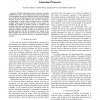Free Online Productivity Tools
i2Speak
i2Symbol
i2OCR
iTex2Img
iWeb2Print
iWeb2Shot
i2Type
iPdf2Split
iPdf2Merge
i2Bopomofo
i2Arabic
i2Style
i2Image
i2PDF
iLatex2Rtf
Sci2ools
142
Voted
IROS
2009
IEEE
2009
IEEE
Bayesian reinforcement learning in continuous POMDPs with gaussian processes
— Partially Observable Markov Decision Processes (POMDPs) provide a rich mathematical model to handle realworld sequential decision processes but require a known model to be solved by most approaches. However, mainstream POMDP research focuses on the discrete case and this complicates its application to most realistic problems that are naturally modeled using continuous state spaces. In this paper, we consider the problem of optimal control in continuous and partially observable environments when the parameters of the model are unknown. We advocate the use of Gaussian Process Dynamical Models (GPDMs) so that we can learn the model through experience with the environment. Our results on the blimp problem show that the approach can learn good models of the sensors and actuators in order to maximize long-term rewards.
Related Content
| Added | 24 May 2010 |
| Updated | 24 May 2010 |
| Type | Conference |
| Year | 2009 |
| Where | IROS |
| Authors | Patrick Dallaire, Camille Besse, Stéphane Ross, Brahim Chaib-draa |
Comments (0)

